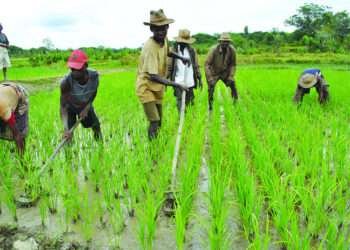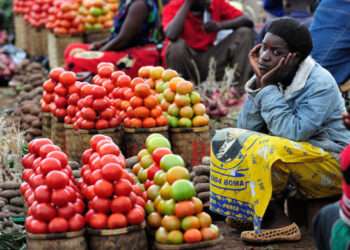A group of Researchers has called on Ghanaian scientists to develop cost-effective climate resilient technologies for farmers to ensure food security.
According to the researchers, Scientists need to consider and develop cost-effective technologies for farmers, not one worth hundreds of dollars.
Dr. Rousseau Djouaka, a Health Expert on the Accelerating Impacts of Climate Research for Africa (AICCRA) project, during Ghana’s capacity strengthening and stakeholder consultation on the project, said farmers need technologies that are economical and within their financial reach.
“The farmers will not adopt a technology if they don’t see its value and the amount of money the technology brings. Ghana must improve and promote accessibility of validated climate information services, build her resilience to climate shocks and prepare her Nationally Determined Contributions (NDCs), a climate action plan to cut emissions and adapt to climate impacts.”
Dr. Rousseau Djouaka
Dr. Djouaka called on agriculture extension workers to train farmers to use the technologies and their importance in improving yield and sustaining the environment.
Like other countries across the globe, Ghana faces the threat of climate-driven biotic stresses such as pest infestations, pathogens, and invasive alien species destroying local biodiversity and ecosystems.
Mr. Ghislain Tepa-Yotto, the Lead Coordinator, AICCRA, said the project chose Ghana because it was among the regions most affected by the climate change impacts, hence the need to work towards intensifying agriculture systems.
“There is the need for us to deploy technologies and innovations that make our food systems much stronger because agriculture is the major contributor to the country’s GDP,” he said.

Agriculture is increasingly impacted by climate change
Agriculture in Ghana and the world is increasingly affected by climate change via changes to weather patterns and more frequent extreme weather events such as floods, storms, and droughts. It is also confronted with the challenge of feeding a growing population.
Current projections estimate that to feed the global population by 2050; food production needs to increase by 60%. An approach developed by the Food and Agriculture Organization of the United Nations (FAO) to respond to these combined challenges is ‘climate-smart agriculture’ (CSA) which aims to enhance agricultural productivity while reducing GHG emissions.
According to the FAO, CSA has three main objectives: the sustainable increase of agricultural productivity, the adaptation and building of resilience to climate change, and the reduction of GHG emissions. Above and beyond technological solutions, there are also many cost-effective practices that have a positive climatic impact, such as better manure management, integrated crop-livestock management, use of renewable energy, use of legumes or cover crops, improved animal feeding, and practices that increase soil carbon.
AICCRA to enhance access to climate information
The AICCRA is under the Consultative Group of International Agricultural Research (CGIAR), a global research partnership to ensure food security, reduce poverty, and enhance nutrition.
The AICCRA project aims at enhancing access to climate information services and validated climate-smart agriculture technologies in Africa, funded by the International Development Association of the World Bank.
The Ghana cluster programme focuses on six intervention regions; Upper West and East, Northern, Bono East, Central, and Greater Accra, where climate-smart agriculture promotion and information services would be piloted and promoted.
READ ALSO: AfDB launches €4 Million Africa Circular Economy Facility





















